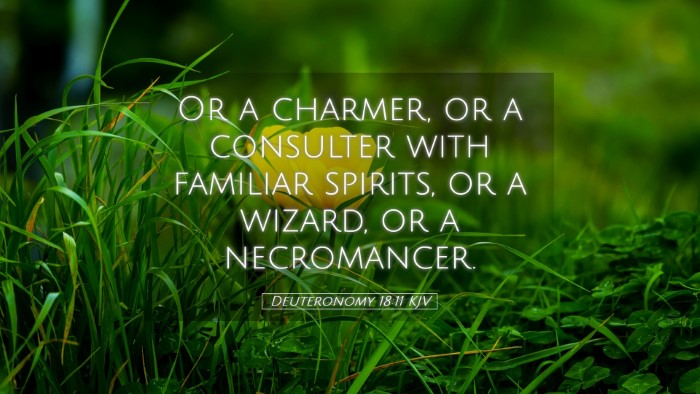Commentary on Deuteronomy 18:11
Verse Reference: Deuteronomy 18:11 - "Or a charmer, or a consulter with familiar spirits, or a wizard, or a necromancer."
Introduction
The verse found in Deuteronomy 18:11 addresses various forms of divination and spirit communication explicitly forbidden in the Old Testament. This scripture reflects God's instructions to His people regarding practices that could lead them away from worshipping Him and into practices commonly associated with paganism. Commentators such as Matthew Henry, Albert Barnes, and Adam Clarke provide invaluable insights into the implications of this verse.
Understanding Forbidden Practices
In the context of Israelite society, the surrounding nations often engaged in practices that invoked the supernatural for guidance, protection, or knowledge. Such practices included:
- Charmers: Individuals believed to enchant others with spells or incantations.
- Consultants with familiar spirits: Those who sought to communicate with the dead or spirits to gain insight.
- Wizards: Practitioners of magic, often invoking supernatural powers for various purposes.
- Necromancers: Specifically those who called upon the dead or attempted to predict the future through them.
Matthew Henry's Insights
According to Matthew Henry, this verse serves as a prescriptive boundary for Israel's spiritual identity. He emphasizes the distinctiveness required of God's people, urging them to rely on divine revelation rather than occult practices.
Henry notes that these forbidden practices lead to spiritual corruption and a departure from true worship. He highlights that God desires His people to seek Him directly and trust His providence and revelation rather than turning to deceptive means for knowledge.
Albert Barnes' Explication
Albert Barnes focuses on the terms used in the verse, explaining that the prohibitions against such practices aim to protect Israel from spiritual contamination. He observes that these “abominations” were common among the Canaanites and other neighboring nations, which would lead to moral and spiritual decay.
Barnes further supports the assertion that God’s calling to His people involved a rejection of such practices, emphasizing that divine laws were given not just to enforce obedience but also to safeguard the community's integrity. The verse underscores the necessity for discernment and commitment to Yahweh alone.
Adam Clarke's Analysis
Adam Clarke elaborates on the historical context of these practices. He writes that such forms of divination were not mere curiosities but serious infractions against the covenantal relationship between Israel and God. Clarke states that the presence of similar practices indicated a deterioration of faith in God’s promises and providences.
By prohibiting these practices, Clarke concludes that God was instilling a trust in His power and guidance rather than in the dark arts or the whims of supernatural entities. He points out the pivotal nature of obedience to God's commandments as a hallmark of a faithful and loyal Israelite.
Theological Implications
The broader theological implications of Deuteronomy 18:11 reveal God's desire for a relationship characterized by fidelity and trust. The people of Israel are called to depend solely on divine revelation rather than human tradition or occult practices. This exclusivity is fundamental to maintaining a holy community set apart for God’s purposes.
Additionally, this verse resonates with New Testament themes that call believers to discernment and steadfast faith in Jesus Christ, the ultimate revelation of God. The practices condemned in this passage find parallels in contemporary discussions around spiritualism, astrology, and other forms of occultism that often infiltrate modern Christianity.
Conclusion
Deuteronomy 18:11 serves as a potent reminder of the distinctions God calls His people to uphold. The combined insights from Matthew Henry, Albert Barnes, and Adam Clarke reinforce the sacredness of God's revelation and the dangers of turning to alternative means of understanding our existence and future. For pastors, students, and scholars, this passage not only challenges believers to evaluate the sources of their spiritual guidance but also to affirm their commitment to the living God who alone holds the keys to life, death, and the future.


